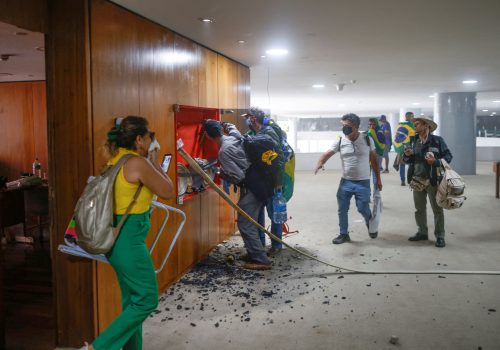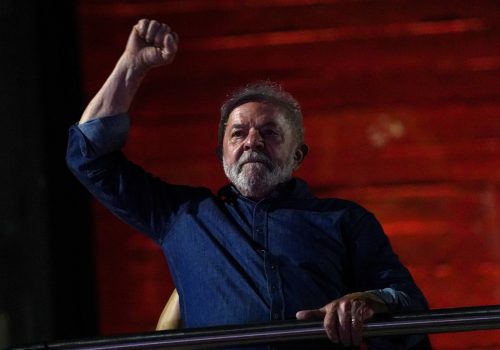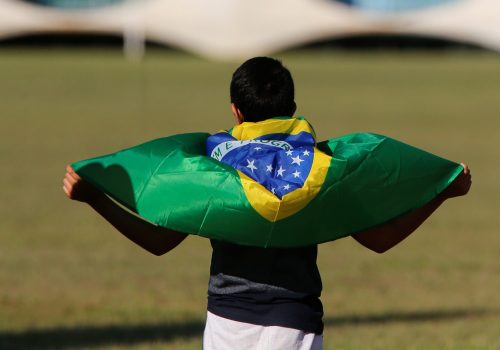How Brazil can respond to its democracy stress test
GET UP TO SPEED
It’s a shock to the system. One week after new Brazilian President Luiz Inácio Lula da Silva was sworn into office, thousands of supporters backing former President Jair Bolsonaro—who falsely claimed that October’s election had been stolen from him—descended upon the country’s Congress, Supreme Court, and presidential palace, leaving shattered windows and overturned furniture in their wake. Now that authorities have cleared the protests and launched an investigation into security failures, our experts break down what’s to come.
TODAY’S EXPERT REACTION COURTESY OF
- Jason Marczak (@jmarczak): Senior director of the Adrienne Arsht Latin America Center
- Iria Puyosa (@NSC): Senior research fellow at the Digital Forensic Research Lab
- Valentina Sader (@valentinasader): Associate director and Brazil lead at the Adrienne Arsht Latin America Center
Failures abound
- Brazil’s January 8 triggered comparisons to the United States’ January 6 attack. “But that is an oversimplification,” Jason says. “In Brazil, rioters were focused on absolute destruction of Brazil’s legislative, judicial, and executive buildings without the ability to disrupt the democratic order.”
- Iria points out that Bolsonaro’s supporters had been planning publicly for days, and the call to action “was not made on fringe or secret sites but in public groups and channels” on TikTok, YouTube, Telegram, and WhatsApp. Security forces “had the chance to take preventive measures,” she says, calling it “inexplicable” that Brazilian authorities never “established strong security controls.”
- Calls rose on Sunday for stronger regulation of social media, Iria tells us, even though Brazil has one of the more “vigorous” regulatory regimes in the region. One way Brazilian policymakers can tackle the problem, she says, is to improve intelligence agencies’ capabilities to monitor open-source data that provides “early warnings” about extremist threats—but in a way that doesn’t “limit freedom of expression and association of citizens.”
- While Lula wasn’t even in Brasília at the time, Jason says that the riots are still a “wake-up call” for the Lula government because they highlight the risks that lie ahead for “the continued peaceful functioning of Brazil’s institutions.”
Subscribe to Fast Thinking email alerts
Sign up to receive rapid insight in your inbox from Atlantic Council experts on global events as they unfold.

Lula’s moment
- “Democracy prevailed, but it’s cracked,” Valentina tells us. While Brazil’s democratic institutions have proven resilient, “they still must be strengthened.”
- According to Valentina, the fact “that some police forces, officials, and financial backers appear to have enabled this anti-democratic vandalism underscores the danger to Brazil’s democratic system.”
- But politicians from across the political spectrum have responded to the riot with an “eagerness to defend democracy,” a rare moment of “common ground,” Valentina says. “Lula must seize the opportunity to pacify the country and gain political power in Congress” to show the strength of democracy, punish wrongdoers, and enact key planks of his policy agenda.
Friends in need
- US President Joe Biden quickly condemned the attack on Sunday. Jason tells us that next, his administration should “take action to reassure the new Lula government that US support will not be in statements alone.”
- That could take the form of a Lula visit to Washington early this year. “That visit should be prioritized and scheduled as soon as possible,” Jason says, “to show Lula and allies around the hemisphere that the United States is here to help when partners are in need.”
- Valentina says the United States can view January 8 as “yet another failed attempt by the extreme right to undermine democracy.” But “amid global trends of declining democratic freedoms and political instability across Latin America and the Caribbean, which country is the next target?”
Further reading
Mon, Jan 9, 2023
Experts react: Brazil has suffered its own attack against democracy. Here’s what the government and its allies can do next.
New Atlanticist By
As the tear gas clears, substantial questions remain about the state of Brazil’s democracy and institutions—and what the United States can do in response to the riot.
Sun, Oct 30, 2022
Lula is back in Brazil. Here’s what’s coming.
Fast Thinking By
How will Brazil reposition itself on the world stage? Our experts peer into the future that awaits.
Thu, Sep 15, 2022
Democratic institutional strength before and beyond elections: The case of Brazil
Issue Brief By Valentina Sader
Brazil—Latin America’s largest economy and the fourth-largest democracy in the world—will elect its next president, governors, congress, and state-level assemblies in October 2022. This is one of the most momentous elections in recent years, a result of the inflection point that Brazil faces.
Image: Supporters of Brazil's former President Jair Bolsonaro demonstrate against President Luiz Inacio Lula da Silva, outside Planalto Palace in Brasilia, Brazil, January 8, 2023. REUTERS/Ueslei Marcelino


